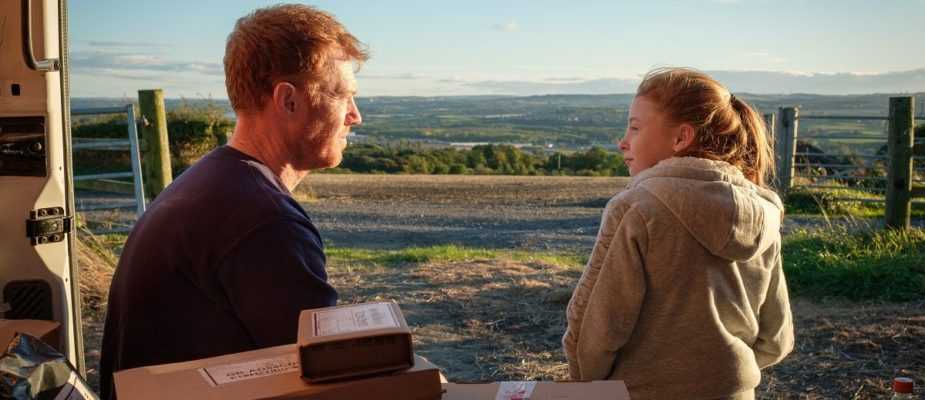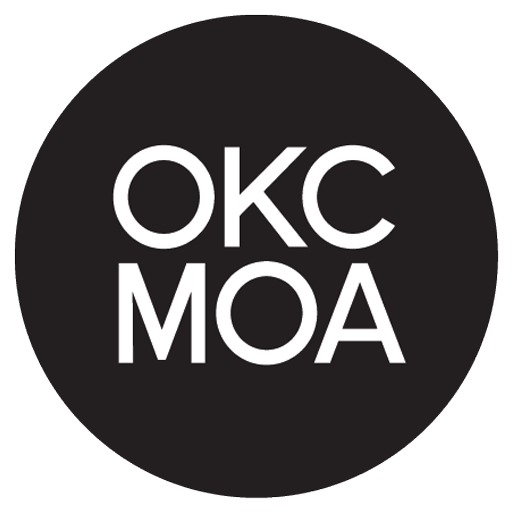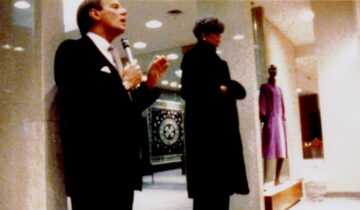Opening this week in OKCMOA’s Virtual Theater: Sorry We Missed You
This week, Museum Films is excited to welcome three new titles to OKCMOA’s virtual theater. A highlight of both Sundance and Cannes, Levan Akin’s And Then We Danced is a gorgeous and inspiring, gay coming-of-age tale set in the high-stakes world of Georgian dance. Screening in a special one-week, limited engagement, acclaimed SXSW documentary The Hottest August is a powerful and poetic portrait of New York City during the anxious summer of 2017. And finally, this week’s featured film, Ken Loach’s Sorry We Missed You, is an essential portrait of a family in crisis.
Ten years after earning the Cannes Film Festival’s highest honor for 2006’s The Wind that Shakes the Barley, venerable British director Ken Loach won his second Palme d’Or for I, Daniel Blake (2016), which made its Oklahoma City premiere in OKCMOA’s Noble Theater. A warm, rousing and ultimately heartbreaking film, I, Daniel Blake follows the title character, an aging master carpenter who struggles to navigate Britain’s byzantine benefits system, after a heart attack leaves him unable to work. Along the way, Blake meets a young, out-of-work single mother named Katie, and the two form a surrogate family as they pool their resources and attempt to make ends meet. Three years later, the now 83-year old Loach returned to the Cannes Competition with Sorry We Missed You, another harrowing and compassionate drama about a family fighting for financial stability.
Based on extensive research and interviews conducted by Loach’s long-time screenwriter Paul Laverty, Sorry We Missed You focuses on Ricky, a skilled construction worker who lost both his job and his house in the 2008 financial crisis. Enticed by the prospect of becoming his own boss and gaining a foothold on financial independence, he takes a job as an independent delivery driver for an Amazon-like company and convinces his wife Abby—a deeply empathetic home-healthcare nurse—to sell her car so he can buy his own delivery van. But when Ricky and Abby’s rebellious teenage son Seb gets into trouble with the police, Ricky is forced to take unauthorized time off work, triggering a downward spiral of fines and lost wages that threatens to destroy the family’s fragile equilibrium.
Loach and Laverty’s decision to take on what, in America, is commonly known as the ‘gig economy,’ found its origin in an eye-opening experience during the production of I, Daniel Blake. As Loach explains in an interview with Film Inquiry:
When we were doing I, Daniel Blake, and we did that scene at the food bank, we were surprised that so many of the people who were coming in had somebody working in the family. So we then tapped into an ongoing concern over the past 40 years, about how the nature of work is changing, like how the old 8-5 job or manual work or even office work are going, they’re increasingly going away.
Personalized work is taking the place of fixed hours and the obligation on the part of the employer to pay the employee a profitable minimum wage is changing. All the responsibilities are being born by the worker, which is an ongoing preoccupation. The shock of seeing working people who are working not able to feed themselves–there are nurses in food banks, which is crazy–is what came together for us really.
Sorry We Missed You extends the economic, social and political concerns that Loach has consistently grappled with over the course of his long and celebrated career, while infusing them with a renewed sense of anger and urgency rooted firmly in the present moment. (In its most recent issue, Film Comment calls Loach “the Bernie Sanders of filmmakers.”) But Sorry We Missed You is rescued from charges of polemicism or propaganda by Loach’s delicate craft and dedicated humanism. Unlike many contemporary dramas about economic hardship, which adopt a frenetic, quick-cut journalistic style to immerse spectators in the gritty reality of their characters, Sorry We Missed You is marked by stark, careful compositions, graceful rhythmic editing and small Ozu-esque grace-notes (Japanese director Yasujiro Ozu, of Tokyo Story fame, was the subject of a small program at OKCMOA a few years back).
Much like the documentaries of Frederick Wiseman, Loach’s film is watchful without being voyeuristic, beautifully crafted without being showy. Loach’s camera observes Ricky, Abby, their young daughter Liza Jane and their son Seb, while letting them retain a sense of mystery, a hidden inner life that reaffirms their dignity as individuals. This dimension of emotional distance or ambiguity is heightened by Loach’s use of non-professional actors, who are less practiced in telegraphing their thoughts and feelings for the camera. In these respects, Loach also displays a philosophical affinity with Italian Neorealist filmmakers like Roberto Rossellini and Vittorio De Sica, whose Bicycle Thieves (available to stream free on Kanopy with a valid Metropolitan Library Card) would make an excellent companion piece to Sorry We Missed You.
Loach’s and Laverty’s humanist approach to characterization extends beyond its protagonists to encompass individuals at the margins of the central action. The film lavishes time and curiosity on each of Abby’s home-care patients, Seb’s female graffiti partner and tentative love interest, even Ricky’s hard-driving boss Maloney whose own professional anxiety is carefully concealed by a mask of fraternal teasing and veiled threats.
Like I, Daniel Blake, Sorry We Missed You is lean, engrossing and briskly paced, peppered with warmth and sly humor, but also like most of Loach’s work, it is not always an easy watch. At once heartrending in its specificity and infuriating in the universality of the situations it depicts, it is a call for empathy, understanding and ultimately for action. And in this moment, when the on-going health crisis continues to further magnify the gap between rich and poor, employed and unemployed, it is one that urgently needs to be heard.
More on Museum Films at Home:
READ: “Critic’s Pick ‘The Hottest August’: Film Review,” by Peter Debruge, Variety
WATCH: Ken Loach and Paul Laverty introduce Sorry We Missed You
OKCMOA Film Society, meet MUBI
More on MUBI:
READ: “Mubi: A Streaming Service With a Ticking Clock,” by Glenn Kenny, The New York Times
WATCH: MUBI’s Favorite Films of 2019
-Lisa K. Broad, Head of Film Programming
The Museum relies on admission revenue from our galleries and films as well as donations to provide rich cultural and educational experiences for all. Please consider making a gift of any size to support the Museum as our community continues to shelter in place.










